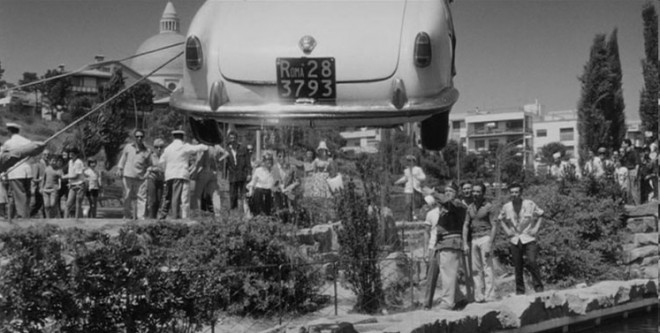Okay, okay; I was wrong to write off postwar René Clair. His return to France after his Hollywood sojourn generated some substantial work, including his dazzling comical take on the Faust legend, La beauté du diable. (Actually, it was filmed in Rome.) Perhaps the exchange that governs the seriousness of Clair’s purpose beneath the film’s glittering, thoroughly entertaining, at times magical surface is this:
FAUST: What will happen to me if I don’t sell my soul to the Devil?
MEPHISTOPHELES: . . . There is real hell on Earth. Poverty, loneliness, misery.
After Mephistopheles has snatched away Faust’s stature, riches and the love of the Princess so that Faust is once again sleeping in a barn alone, except for the rats, Faust will gladly sell his soul in order to have his success—his dream of success—restored. It is then that Mephistopheles taunts Faust with philosophy: “What is man’s life but a dream? . . . All happiness is an illusion.” Old Faust’s dreamt-of “happiness,” it turns out, is as much an illusion as his youthful appearance. There’s no escaping “fate,” the “reality” of Lucifer that Mephistopheles, Lucifer’s agent, represents.
But we know that Mephistopheles is tricking Faust!
Something odd tickles me. In cinema, Clair’s La beauté du diable is the granddaddy of all the body-switching comedies of the past quarter-century. I have seen a few of these, and compared to them Clair’s film is in a class by itself. It adds to the fun that one must constantly remind oneself that the “fellow” who looks like the perpetually young Mephistopheles is really Faust, and that “Faust” is really Mephistopheles. It is the same fun, tied to its message about nurture and environment, that we experience as we remind ourselves who is “black” and who is “white” when we read Mark Twain’s hilarious novel Pudd’nhead Wilson, where two babies, one poor black, one posh white, are switched and raised accordingly. Add to this that the period-element in Clair’s film—presumably, the action takes place around 1700—delightfully dissolves and disappears, as it rarely, if ever, does in a Hollywood film. We are drawn in.
A great passage: Mephistopheles showing Faust his fated future in a palace mirror.
Add, also, this: the film’s dark, sparkling visual form isn’t disgracefully inferior to that of Murnau’s stormier, more gripping silent Faust (1926). Alas, Marguerite doesn’t properly weigh in in either film.
Add one thing more, though, in this film’s favor: the superb acting of both Michel Simon (best actor, Italian National Syndicate of Film Journalists) and Gérard Philipe. It is even more fun, for me, to watch Faust, with his “slippery soul,” elude Mephistopheles’ grasp for as long as he can than to watch Mephistopheles’ dedicated attempts to lasso in Faust. Faust’s stubborn pride, of course, proves both his initial triumph and later downfall.
But stay tuned. The people of France combat Mephistopheles and save the soul of Henri Faust!
B(U)Y THE BOOK
MY BOOK, A Short Chronology of World Cinema, IS CURRENTLY AVAILABLE FROM THE SANDS FILMS CINEMA CLUB IN LONDON. USING EITHER OF THE LINKS BELOW, ACCESS THE ADVERTISEMENT FOR THIS BOOK, FROM WHICH YOU CAN ORDER ONE OR MORE COPIES OF IT. THANKS.
